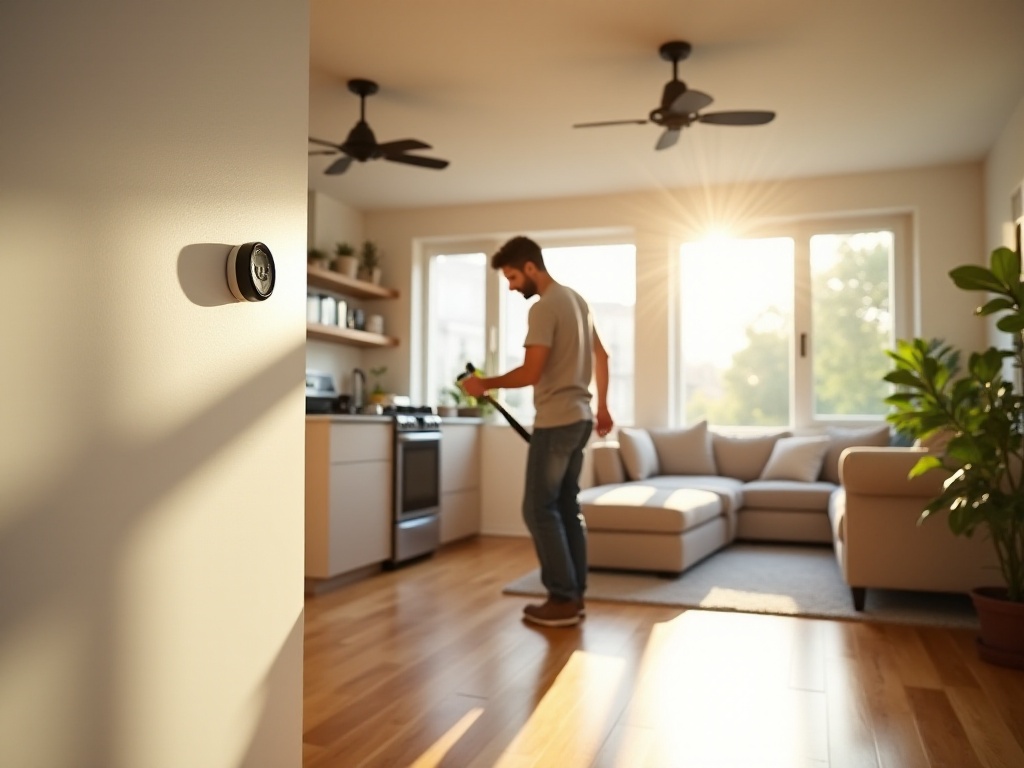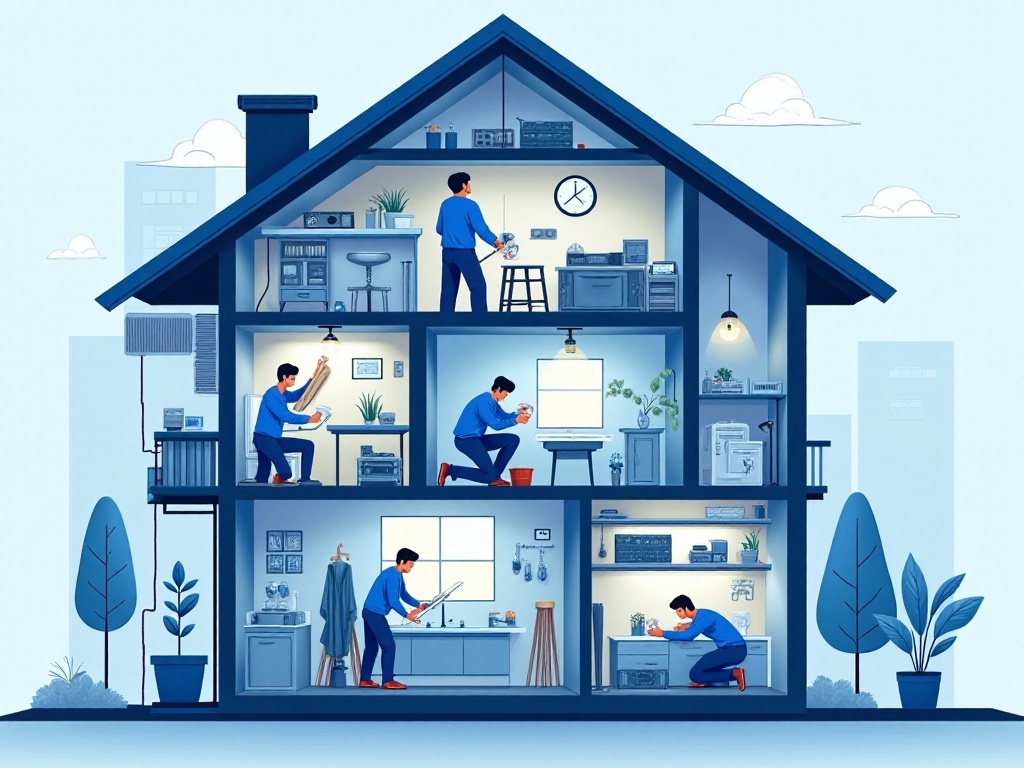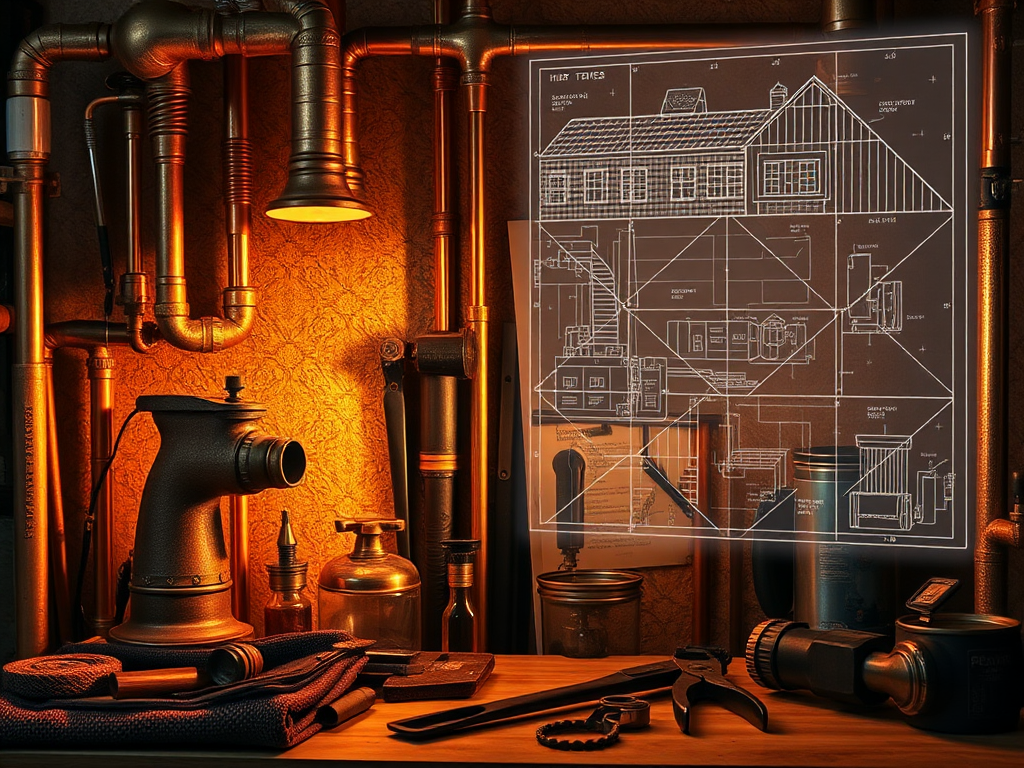Opening Chat
I remember the day last month when my faucet suddenly started leaking. I was lying on the couch watching a show when I heard a "drip, drip" sound from the kitchen. This reminded me of a video I had seen earlier about how the average household could lose tens of thousands of dollars annually due to poor home maintenance. After several experiences with professional repairmen, I decided to study home maintenance techniques thoroughly. Through years of exploration and practice, I've developed a set of money-saving and practical home maintenance secrets that I'd like to share with you today.
Monthly Must-Check
When I first started doing home maintenance checks, I found it quite troublesome and thought that as long as things seemed to work, they were fine. However, once during a routine check, I discovered that the washing machine's drain pipe connection was slightly loose. If I hadn't found and fixed it in time, it could have suddenly detached during use, causing a flood. Since then, I've understood the importance of regular inspections.
Now, at the end of each month, I specifically set aside a weekend for comprehensive inspections. The first things I check are the safety devices. I've installed smoke detectors on the ceilings of bedrooms and kitchen, and test them monthly by pressing the test button. Speaking of which, I must mention an incident from last month: I accidentally forgot to turn off the stove while cooking steak, and if it weren't for the smoke detector's timely alarm, the consequences would have been unthinkable.
Besides safety equipment, checking basic infrastructure is crucial. I carefully inspect all water pipe connections, especially places prone to leaks like under sinks and toilet bases. During inspection, I usually feel around the pipes for moisture and look for water stains or rust. Last summer, using this method, I discovered a tiny crack in the kitchen sink's drain pipe and fixed it for less than a hundred dollars. If I hadn't found it then, and the leak had expanded to damage the cabinet base, the repair costs would have been several times higher.
Monthly checks of electrical appliances are also important. I inspect all plugs and cords for aging or damage. I pay special attention to frequently bent areas of cords, like phone chargers and laptop power cables. Once when I found the rice cooker's power cord covering was cracking, I replaced it immediately - you can't take chances with such hazards.

Seasonal Deep Clean
Home maintenance tasks vary with each season. Spring is the most important maintenance season, as many problems become apparent after winter.
First is checking the house exterior. I pay special attention to the roof and exterior walls for cracks or signs of leakage. Last spring, during inspection, I found lots of leaves accumulated in the roof gutters. If not cleared in time, this could have caused water backup during heavy rain. While cleaning, I also found some loose tiles and had them fixed immediately, avoiding a potential leakage disaster.
Summer focuses on air conditioning system maintenance. Every May, I schedule professional AC cleaning service. Although it costs three to four hundred dollars per cleaning, the cleaned AC not only cools better but also uses significantly less electricity. A colleague of mine neglected maintenance last summer, and his AC broke down during the hottest days. With repair workers fully booked, he had to endure several uncomfortable days before getting it fixed - an experience I'd rather avoid.
Fall emphasizes checking door and window seals. I inspect all door and window gaskets for integrity and secure components. Through such an inspection last year, I discovered deteriorated seals on a living room window. After timely replacement, the room's insulation improved notably, saving considerable heating costs in winter.
Winter requires special attention to freeze prevention. Outdoor pipes need proper insulation, especially those on the north side. A neighbor's external wall pipe cracked during severe cold weather two winters ago due to lack of insulation, resulting in costly repairs and wall seepage. Learning from this lesson, I now wrap all outdoor pipes with insulation cotton before winter. Though the materials cost just over a hundred dollars, it saves a lot of worry.

Quick Emergency Response
Even with regular maintenance, emergencies sometimes occur. However, many seemingly difficult problems have simple solutions.
For instance, when a kitchen range hood suddenly loses power, many people's first reaction is to replace it. Most times, it's just clogged oil nets. My solution is: remove the oil net and soak it in hot water with some detergent for half an hour, gently scrub with a soft brush, rinse thoroughly with clean water, dry, and reinstall - the hood will regain its strong suction power.
For toilet clogs, many immediately call a plumber. Actually, try this method first: pour some baking soda into the toilet, followed by vinegar, wait a few minutes, then flush with hot water. I've used this method successfully several times, and it's much cheaper than calling a repair service.
Scratches on floors or furniture are also common issues. For light-colored wooden furniture, I use walnut kernels: crack open the nut and gently rub the flesh on the scratch - the oily substance seeps into the wood grain, making scratches less noticeable. For dark furniture, coffee grounds work well too.
Sometimes door hinges start squeaking. Instead of replacing them, simply apply some olive oil or cooking oil, and the noise disappears. I've maintained my wooden doors this way for several years, and they still open and close smoothly.

Equipment Maintenance
Regarding household appliance maintenance, I believe developing correct usage habits is key. Many appliance failures actually result from improper use.
Take refrigerators for example. Many people like to pack their fridges full, thinking it maximizes space usage. Actually, this affects cooling efficiency and increases power consumption. I maintain my fridge at 70% capacity, leaving appropriate gaps between items for proper air circulation. Also, keep the refrigerator back at least 10 centimeters from the wall, with space on sides for heat dissipation.
Washing machine maintenance is also important. Many people habitually close the washing machine door right after use, which can breed mold. I always leave the door open after use to let the drum dry thoroughly. Monthly, I run an empty cycle with vinegar and baking soda, which eliminates odors and prevents limescale buildup.
My water heater has worked like new for five years. The secret is descaling every six months. I have professionals do this, and though it costs two to three hundred dollars each time, it's more economical than replacing the water heater. Regular descaling also improves heating speed and water flow, while saving electricity.
The lifespan of induction cooktops largely depends on maintenance. I always wait for complete cooling before wiping, using only specialized cleaners to avoid residue from regular cleaners affecting use. Keep pot bottoms flat and clean to avoid affecting heating efficiency and scratching the cooktop surface.

Words of Experience
After sharing these specific maintenance tips, I'd like to share some experience gathered over the years.
First, prevention is always better than cure. Many seemingly minor problems can develop into major troubles if ignored. Take my balcony leak for example - it started as a tiny crack that seemed insignificant, but as we delayed, rain penetration worsened, eventually requiring major repairs costing several thousand dollars. Since then, I've understood the importance of addressing small repairs promptly.
Second, tools are important, but knowing how to use them is more crucial. I've seen many homes with toolboxes full of professional tools, yet when problems arise, they don't know which to use. My advice is, rather than buying many unused tools, start with basics: a good screwdriver set, a comfortable wrench, a roll of Teflon tape - these are the most commonly needed for home maintenance.
Third, learn to distinguish between DIY-able tasks and those requiring professionals. Simple jobs like replacing faucet washers or unclogging drains can be learned easily. But high-risk projects involving electrical or gas pipe repairs must be handled by professionals.
Finally, I suggest maintaining a home maintenance log recording purchase dates, warranty periods, and repair records for various equipment. This helps better track maintenance cycles and provides useful reference for repairs. I use my phone's notes app - simple and practical.
Ultimately, home maintenance is a continuous accumulation process. It might seem troublesome at first, but once it becomes a habit, you'll find these efforts worthwhile. A well-maintained home not only saves repair costs but also makes living more comfortable and worry-free. Over these years, these maintenance techniques have saved me at least tens of thousands in repair costs, and more importantly, we rarely face those headache-inducing emergencies.
Do you have any unique home maintenance tricks? Please share in the comments. Through our discussion, we can surely discover more practical maintenance tips. After all, every home is unique, and your experience might help others.
Related articles




